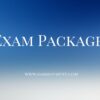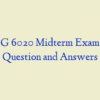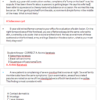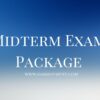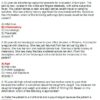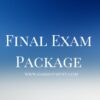Description
NSG 6020 Week 1 Quiz 1, Building a Comprehensive Health History
- When recording assessments during the construction of the problem-oriented medical record, the examiner should:
- What finding is unique to the documentation of a physical examination of an infant?
- The quality of a symptom, such as pain, is subjective information that should be:
- When communicating with older children & teenagers, you should be sensitive to their:
- J.M. has been seen in your clinic for 5 years. She presents today with signs & symptoms of acute sinusitis. The type of history that is warrant is a(n) _____ history.
- An example of a complementary care modality is:
- Mr. D. complains of a headache. During the history, he mentions his use of alcohol & illicit drugs. This information would most likely belong in the:
- In issues surrounding ethical decision making, beneficence refers to the:
- Which of the following is an effective adjunct to document location of findings during recording of physical examinations?
- The examiner s evaluation of a patient s mental status belongs in the:
- Which of the following is consider an IADL but not an ADL?
- Constitutional symptoms in the ROS refer to:
- Which action would best promote accurate translations as well as confidentiality when the caregiver does not speak the patient s language?
- Allergies to drugs & foods are generally listed in which section of the medical record?
- During an interview, tears appear in the patient s eyes & his voice becomes shaky. Initially, you should:
- Which question would be consider a leading question?
- Periods of silence during the interview can serve important purposes, such as: nsg 6020 week 1
- After you ask a patient about her family history, she says, Tell me about your family now. Which response is generally most appropriate?
- A brief statement of the reason the patient is seeking health care is call the:
- The duties of care providers established by tradition, and within the context of culture, are……:

